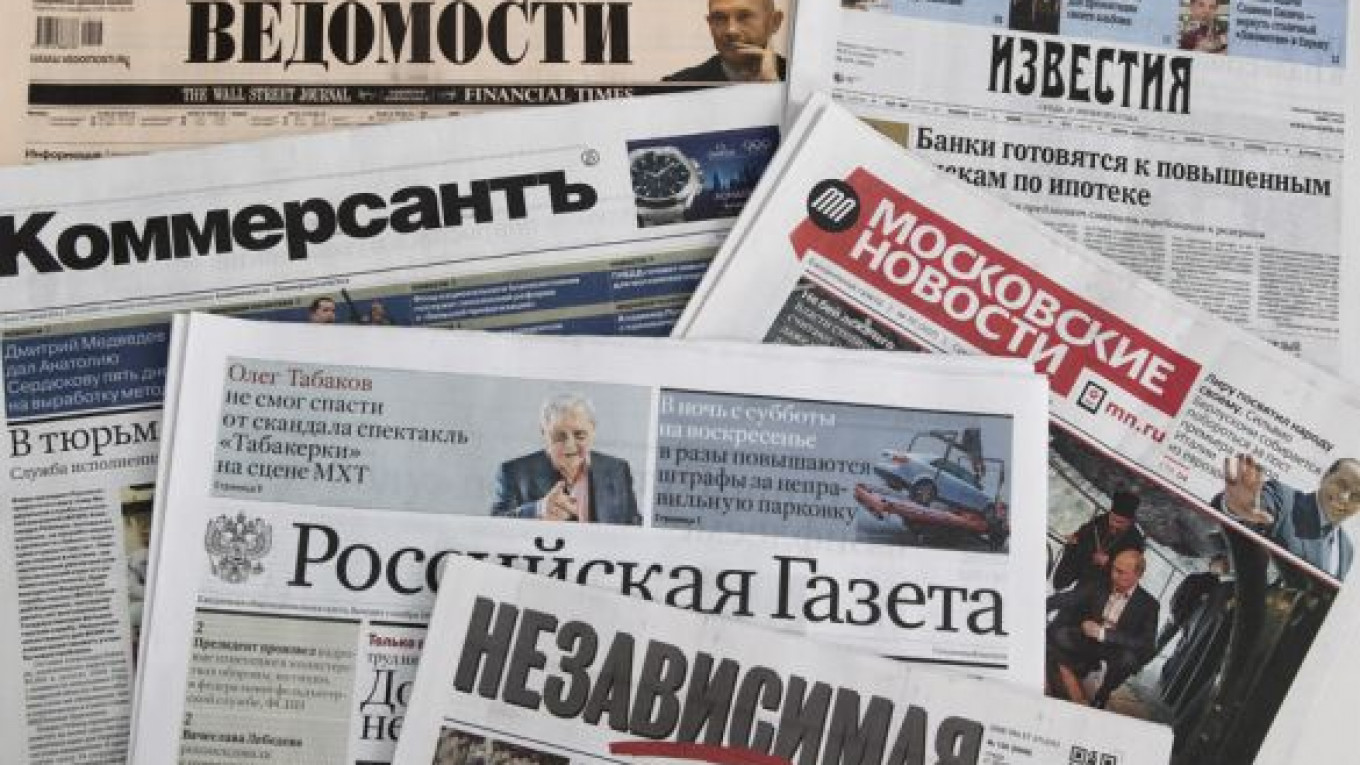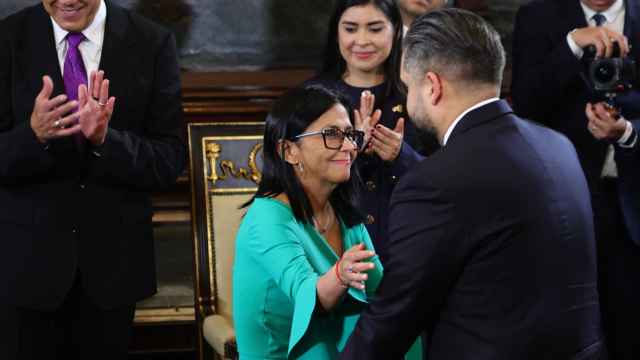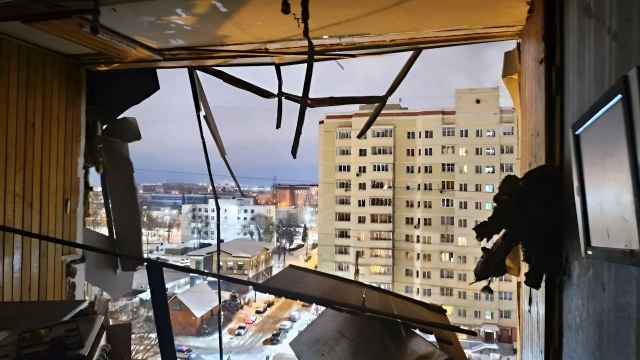Kommersant
1. Kirill Melnikov and Yegor Popov article headlined "Rosneft wants back to port" says the Russian oil company Rosneft is seeking to buy a 20-percent stake in the Novorossiisk sea commercial port. The company is going to start offshore exploration drilling in the Black Sea and needs a coastal base of developed transportation infrastructure; pp 1, 11 (549 words).
2. Ivan Safronov article headlined "Alexander Dombrovsky's dismissal declaration filed" say Prime Minister Dmitry Medvedev has sacked deputy director of the Federal Service for State Orders Alexander Dombrovsky for inaccurate information in the latter's income statement; pp 1-2 (434 words).
3. Yury Barsukov and Oleg Gavrish article called "Ukraine will not be let go without advance payment" says that "Russia is again prepared to use gas as a weapon in its political struggle with Ukraine". At a cabinet meeting on Oct. 29, Gazprom CEO Alexei Miller announced that Ukraine owed some $882 million for Russian gas supplies in August and may now be asked to pay in advance; pp 1, 11 (843 words).
4. Vyacheslav Kozlov and Diana Munasipova article headlined "Something to be written about municipal deputies in Criminal Code" says lawmakers and human rights activists are going to propose amendments to the Criminal Code that would introduce jail sentences for attacks on lawmakers. The initiative has emerged in the wake of an attack against a Moscow district deputy Yelena Tkach who has been beaten up; p 3 (627 words).
5. Anton Arsenyev et al. article headlined "Moscow and St. Petersburg fitting into new constituencies" says the cities of Moscow and St. Petersburg have been allowed to choose an election system for their parliaments. Moscow is likely to have the entire city council elected in single-seat constituencies; p 3 (684 words).
6. Maxim Ivanov article headlined "Accession to charter to proceed as planned" says the Russian government is to approve today an action plan for the implementation of the G8 Open Data Charter; p 4 (583 words).
7. Valery Lavsky and Sofya Samokhina article headlined "Golos heard in Novosibirsk court" says a court in Novosibirsk has ruled that the local branch of the election monitoring NGO Golos Siberia is not a foreign agent and does not need to register as such; p 4 (486 words).
8. Dmitry Malkov article headlined "Sayano-Shushenskaya hydroelectric power plant stands until trial" reports on the start of a trial in connection with a failure at the Sayano-Shushenskaya hydroelectric power plant in August 2009 that killed 75 people; p 5 (701 words).
9. Alexander Zheglov and Ivan Safronov article headlined "Helicopter did not get to residential buildings" gives details of a Ka-52 helicopter crash in Moscow's Zhulebino district; p 5 (549 words).
10. Ivan Buranov and Olga Churakova article called "St. Jude cuts electricity supply in northwest of Russia" says the powerful St. Jude storm has reached the northwest of Russia, leaving over 63,000 people without electricity supply; p 5 (400 words).
11. Oleg Rubnikovich article headlined "Damage caused by Navalny brothers halved" says opposition leader Alexei Navalny and his brother Oleg have been formally charged with embezzling around $1 million; p 6 (577 words).
12. Alexei Sokovnin article called "Investigators distribute roles in Bolshoi Theatre" reports on the start of hearings in connection with an acid attack on the Bolshoi Theatre ballet artistic director Sergei Filin; p 6 (510 words).
13. Kirill Belyaninov article headlined "U.S. decides they cannot keep an eye on everyone" looks at new developments in the U.S. covert surveillance row and says that European partners want the U.S. to sign an agreement on ruling out mutual espionage, but the latter is reluctant to do so; p 7 (517 words).
14. Oleg Ivanov and Gennady Sysoyev article headlined "Tomislav Nikolic to pay visit to investor" looks ahead at today's meeting between President Vladimir Putin and his Serbian counterpart Tomislav Nikolic. Crisis-hit Serbia is looking for money and Russia is viewed as its primary investment partner; p 7 (428 words).
15. Tatyana Yedovina article headlined "Doing Business considered too far from reality" says Russia has moved up in the Doing Business ranking, while China has gone down. The latter does not seem to care, though, as it has called the ranking "discriminatory against developing countries"; p 8 (542 words).
16. Yegor Popov and Anna Zibrova article headlined "Russian Railways invited to join construction in the Andes" says the Russian railway operator may embark on a new project abroad: building a railway in the Ecuadorian Andes; p 11 (565 words).
17. Anna Solodovnikova article headlined "Rosneft finds right minority shareholders" says Rosneft has sold a 10-percent stake in RN Holding (formerly TNK-BP Holding) for some $3.1 billion. The deal is expected to help the oil company negotiate a price for the buyback of TNK-BP shares from minority shareholders; p 9 (563 words).
18. Olga Mordyushchenko and Natalya Skorlygina article headlined "Preventive payment" says Russian gas consumers owe Gazprom over 100 billion rubles, forcing the company to reconsider its payment procedures and make households pay for gas supplies in advance; p 9 (624 words).
19. Dmitry Butrin article headlined "Crime will wait for better times" outlines an anti-crime programme released on Oct. 29 by the Interior Ministry; p 8 (603 words).
20. Yelena Kiseleva et al. report "VEB exchanges bad debts for good ones" says that the government is looking for sources of recapitalization of the bank Vneshekonombank; pp 1, 10 (1,000 words).
Vedomosti
1. Yelizaveta Sergina article headlined "First multimedia one" describes the draft expansion strategy of the Russian telecommunications operator Rostelecom that plans to increase the number of broadband subscriptions by 20 million; p 10 (543 words).
2. Andrei Kolesnikov op-ed called "Political economy: Crisis of power language" says the policy of mild managed nationalism has backfired as xenophobic sentiments are spreading in society; p 7 (437 words).
3. Alexander Vorobyov article headlined "Family games" says spectators are unlikely to find accommodation in the vicinity of Olympic facilities in Sochi during the Games as all hotels have already been booked for national delegations; p B2 (1,264 words).
4. Sergei Titov and Artyom Malyutin article headlined "Business scared by tax" says that small and medium-sized businesses will be hit hard by a new tax on commercial property that is to be considered by the Federation Council today; p 5 (622 words).
5. Editorial headlined "New meaning of history" says the historians who were commissioned to write a new state-approved history textbook for schools are faced with the unenviable task of combining patriotism with an accurate coverage of historic events; p 6 (338 words).
6. Mikhail Serov article called "Gazprom to spend trillion" says the Gazprom board of directors has approved a 45-percent rise in the company's investment programme this year to an equivalent of $31 billion; p 13 (524 words).
7. Milana Chelpanova and Galina Starinskaya article headlined "Rushailo to protect pipe" says Vladimir Rushailo, who used to be Russian interior minister and secretary of the country's Security Council, has been appointed as Transneft's vice-president in charge of security. The new job will keep him busy, with the 14,000-strong security personnel and an extensive pipeline network; pp 1, 13 (549 words).
8. Margarita Lyutova and Filipp Sterkin article headlined "Money from poison" says Vedomosti has got a copy of a letter by the Natural Resources and Environment Ministry to Deputy Prime Minister Igor Shuvalov, in which the ministry suggests tripling hazardous waste generation fees to bridge budget gaps and encourage manufacturers to invest in new equipment; p 4 (633 words).
9. Editorial headlined "Everyone is in debt to Gazprom" says the Russian gas giant is going to make Ukraine pay for gas supplies in advance, most likely because of its looming association with the EU. At home, Gazprom has already been granted permission to charge households for gas in advance in view of growing utility arrears. At the same time, the company has boosted its investment programme; pp 1, 6 (399 words).
10. Alexei Rozhkov article called "Virtual tickets to Sochi" says over 50 percent of tickets to Sochi Olympic events have already been sold; pp B6-B7 (1,043 words).
11. Mikhail Serov and Yelena Khodyakova article headlined "First money, than gas" says Prime Minister Dmitry Medvedev has backed the proposal of Gazprom CEO Alexei Miller to charge advance payments for Russian gas supplies to Ukraine because of the unpaid August bill; p 12 (648 words).
12. Maxim Tovkaylo article headlined "City for any budget" reports on the current state of affairs in Sochi where preparations are in full swing for the 2014 Winter Olympics that open in less than 100 days; p B1 (1,423 words).
13. Middle East expert Eldar Kasayev article headlined "Foreign trade. Business secrets of Middle East" looks at the prospects of doing business with Iraq and Qatar; p 6 (1,595 words).
14. Darya Borisyak report "Bankers threatened with loss of vote" says that the Central Bank will seek that violations in banks are rectified not only by the banks themselves, but by the owners of 10 percent of their capital; pp 1, 14 (700 words).
15. Maxim Glikin report "Elections bypassing cash desk" says that searches have been carried out at the administration of Bashkortostan and at the local headquarters of the United Russia party; p 2 (950 words).
Nezavisimaya Gazeta
1. Viktoria Panfilova article headlined "Moscow gives bonus to Rahmon" says an agreement has been signed that will enable labor migrants from Tajikistan to get three-year work permits in Russia. Experts say Moscow wants to support Tajik President Emomali Rahmon who is running for re-election; p 7 (823 words).
2. Ivan Rodin article called "Finance Ministry to economize on United Russia" says the Finance Ministry has devised a formula that the Russian regions will be encouraged to use to bring the salaries of local authorities in line with the average monthly pay in the region; pp 1, 3 (1,032 words).
3. Vladimir Mukhin article headlined "Sergei Shoigu to make army healthier" says the Finance Ministry is determined to restore its healthcare infrastructure; pp 1-2 (579 words).
4. Sergei Kulikov article called "Dmitry Medvedev cancels gas communism for Ukraine" says Gazprom may have to cut off its gas supply to Ukraine because the latter is unlikely to be able to pay for gas in advance. Experts forecast the bankruptcy of the Ukrainian state-owned oil and gas company Naftohaz Ukrayiny; pp 1, 4 (1,000 words).
5. Tatyana Ivzhenko article headlined "Crimean Tatars change leader" reports on the election of a new head of the Majlis of the Crimean Tatar People; pp 1, 7 (854 words).
6. Igor Naumov article headlined "Russian province gets separated from state" discusses the results of a three-year study showing that up to 80 percent of people living in small towns and rural areas get seasonal jobs in big cities and are paid off the books; pp 1, 4 (690 words).
7. Yevgenia Novikova report "Iran offers IAEA new compromises" says that Tehran intends to convince as soon as possible the IAEA of the peaceful nature of its nuclear programme; pp 1, 8 (600 words).
8. Editorial headlined "How one can become president or head of choreographic school" says the appointment of Nikolai Tsiskaridze as head of the Vaganova ballet academy raises a lot of questions, given the fact that the decision appears to have been made in secrecy; p 2 (483 words).
9. Andrei Serenko column headlined "Carte Blanche: Why Edward Snowden did not marry Anna Chapman" speculates that fugitive NSA contractor Edward Snowden may stand for U.S. president as he is winning wider public support in the U.S. amid the surveillance scandal. The slogan "Snowden for U.S. president" seems no more fantastic than "Navalny for Russian president", the author says; p 3 (609 words).
10. Anastasia Bashkatova article headlined "Russians concerned with taxes and pensions" says a poll by the Romir pollster has shown that 28 percent of those interviewed want the government to increase pensions and allowances and 17 percent want taxes to be brought down, up from 11 percent who called for tax cuts in 2005; p 4 (854 words).
11. Tatyana Dvoynova article headlined "Gazprom reaches 'Leopard' land" says the gas giant has presented to investors its project for building an LNG plant in the Primorye region. Environmentalists oppose the choice of location for the facility in Khasansky District because it borders a nature reserve; p 5 (732 words).
12. Olga Loginova article headlined "Sochi residents will have to change cars for commuter trains" looks at public transportation arrangements during the Sochi Olympics; p 6 (728 words).
13. Darya Tsilyurik article headlined "No place for disposing of Syrian sarin" says Syria has been meeting deadlines for handing over its chemical weapons to the international community, but the key problem now is where to destroy them; p 8 (692 words).
14. Yury Panyev report "Obama will no longer spy on Merkel" says that the White House and the U.S. special services are putting the blame for espionage in relation to allies on each other; p 8 (700 words).
Izvestia
1. Petr Kozlov report "Putin asked not to give investigators tax-related cases" says that Russia's three biggest business organizations are ready to unite and come out against amendments to the Criminal Code returning investigators a right to institute tax-related criminal proceedings; pp 1-2 (600 words).
2. Yekaterina Kvon report "Federal Penal Service officials caught in fraud with prisoners' DNA" says that fraud has been revealed at the Federal Penitentiary Service; pp 1-2 (600 words).
3. Yelena Teslova report "Supporters of Kudrin and Prokhorov organize civil forum" says that Alexei Kudrin's Civil Initiatives Committee, members of Mikhail Prokhorov's Civil Platform party and public activists plan to hold the all-Russia public forum on Nov. 22 to formulate "Russia's agenda", p 2 (1,100 words).
4. Ivan Cheberko interview with the head of the Russian Federal Space Agency (Roscosmos), Oleg Ostapenko; p 3 (1,300 words).
5. Igor Yavlyansky report "U.S. Senate probes into eavesdropping scandal" looks at the U.S.-EU eavesdropping scandal and features a Russian expert's comment; p 7 (750 words).
6. Maxim Sokolov article headlined "Glory of Roman name" looks at the scandal over the US secret services' eavesdropping on telephone conversations of EU leaders; p 8 (900 words).
Rossiiskaya Gazeta
1. Vyacheslav Prokofyev interview with Jean-Pierre Chevenement, France's special envoy to Russia, headlined "Monsieur special envoy" previews the visit of French Prime Minister Jean-Marc Ayrault to Moscow on Nov. 1 and his meeting with Dmitry Medvedev. Chevenement emphasizes the need for a compromise on Syria; speaks about Russian-French economic cooperation and backs the idea of moving towards the abolition of visas; p 11 (1,070 words).
2. Fedor Lukyanov op-ed headlined "Hero of his time" looks at the legacy of the outgoing Georgian president, Mikheil Saakashvili, notes that his policy of enforcing democracy in Georgia has not won him public support; p 8 (693 words).
3. Vladimir Kuzmin article headlined "Advance payment for gas" reports on a cabinet meeting chaired by Medvedev, where Gazprom CEO Alexei Miller has brought up the subject of Ukraine's debt for Russian gas supplies; p 2 (676 words).
4. Column by chairman of the State Duma's labour and social policy committee Andrei Isayev headlined "Trade unions and economic crisis" gives details of a conference of the Federation of Independent Trade Unions that ended on Oct. 29 and says that unions will have to fight against employers who will try to solve their problems at the expense of workers amid recession; p 2 (454 words).
5. Kira Latukhina article headlined "Road to equator" gives a factual account of a meeting in Moscow between President Vladimir Putin and his Ecuadorian counterpart Rafael Correa; p 2 (480 words).
6. Yevgeny Shestakov article headlined "Snowden opens Obama's eyes" says Edward Snowden's revelations about U.S. covert surveillance in Europe has triggered true spy mania there, and slams British Prime Minister David Cameron for getting at the Guardian that published the leaked information; p 8 (679 words).
7. Yury Medvedev interview with deputy director of the Oceanography Institute Leopold Lobkovsky headlined "Arctic bridge", who says Russian scientists have been able to obtain information that reinforces Russia's rightful claim for the Arctic shelf; p 14 (1,337 words).
8. Tatyana Zykova report "Into financial frame" says that for the first time, the government and deputies want to limit officials' salaries and funds for buying service cars; pp 1, 6 (900 words).
9. Taras Fomchenkov article called "Propane or fall" says that an advance payment scheme may be introduced for the supply of Russian gas to Ukraine; p 2 (600 words).
Moskovsky Komsomolets
1. Yekaterina Sazhneva article headlined "Fraudster or spy?" says that the former head of a research institute under the Defense Ministry, who was arrested on Oct. 29 on suspicion of embezzling over 500 million rubles, is an American citizen. Five years ago Moskovsky Komsomolets published an article alleging that he may have been spying for the U.S.; pp 1, 3 (678 words).
2. Yulia Kalinina column headlined "Russian flag with German pattern" says she was shocked to see the Volkswagen logo on a Russian flag that Russian figure skater Yulia Lipnitskaya spread upon her victory at a Grand Prix tournament in Canada. "A trademark on a state symbol means the end of the state," the author concludes; pp 1-2 (451 words).
3. Mikhail Zubov interview headlined "Fourteen years wasted!" with Alexei Didenko, an lawmaker representing the Liberal Democratic Party, who plays down the significance of Vladimir Zhirinovsky's idea of population control in Chechnya; p 2 (514 words).
4. Mikhail Zubov article headlined "Does Putin want to revive Komsomol?" reports on a concert that marked the 95th anniversary since the founding of the VLKSM, the youth branch of the Soviet Union Communist Party; p 2 (470 words).
5. Stanislav Belkovsky article headlined "Saakashvili: Apology of loser" looks at the rise and fall of the outgoing Georgian president, Mikheil Saakashvili, and credits him with transforming Georgia into a European country; p 3 (1,255 words).
6. Dina Karpitskaya article called "American professor thanks Putin for anti-gay law" summarizes a news conference by professor Paul Cameron, an anti-gay propagandist, who has visited Moscow; p 12 (500 words).
Novaya Gazeta
1. Yelena Milashina article headlined "Winner does not take it all" looks at the general public mood after the presidential election in Georgia; pp 10-11 (1,900 words).
2. Alexander Mineyev article headlined "Immunization against 'Arctic fever'" features ecologist Neil Hamilton's comments on the charges brought against the Greenpeace activists in Russia; p 16 (900 words).
RBC Daily
1. Alexander Litoy article headlined "Russian Marches to be held in Moscow" analyses the upcoming nationalist rally Russian March expected to be held in Moscow on the Day of People's Unity, Nov. 4; pp 1-2 (500 words).
2. Yulia Kalachikhina article headlined "London looks at East" features expert comments on Britain becoming the first country outside the Muslim world to issue Islamic bonds; p 4 (400 words).
Noviye Izvestia
1. Sergei Putilov article headlined "Ghost of gas anti-communism" says Russian gas giant Gazprom is stepping up pressure both on the Ukrainian and regional Russian consumers for failing to pay for gas supplies; p 3 (800 words).
Krasnaya Zvezda
1. Alexander Frolov interview with former Russian ambassador to India Vyacheslav Trubnikov, speaking on the prospects and problems of the Russian-Indian relations; p 3 (1,200 words).
Komsomolskaya Pravda
1. Kristina Desyatova and Alexandra Krylova article headlined "Alligator crashed only a few steps away from apartment blocks" looks at the crash of the Russian Ka-52 combat helicopter in southeast Moscow on Oct. 29 and features expert comments on the possible reasons of the crash; p 7 (500 words).
2. Yelena Krivyakina interview with human rights activist and one of the authors of the amnesty bill for Russian prisoners which is expected to be announced in December, Andrei Babushkin, who details the future amnesty; p 11 (1,100 words)
A Message from The Moscow Times:
Dear readers,
We are facing unprecedented challenges. Russia's Prosecutor General's Office has designated The Moscow Times as an "undesirable" organization, criminalizing our work and putting our staff at risk of prosecution. This follows our earlier unjust labeling as a "foreign agent."
These actions are direct attempts to silence independent journalism in Russia. The authorities claim our work "discredits the decisions of the Russian leadership." We see things differently: we strive to provide accurate, unbiased reporting on Russia.
We, the journalists of The Moscow Times, refuse to be silenced. But to continue our work, we need your help.
Your support, no matter how small, makes a world of difference. If you can, please support us monthly starting from just $2. It's quick to set up, and every contribution makes a significant impact.
By supporting The Moscow Times, you're defending open, independent journalism in the face of repression. Thank you for standing with us.
Remind me later.






